Book Reviews by Pramila Venkateswaran
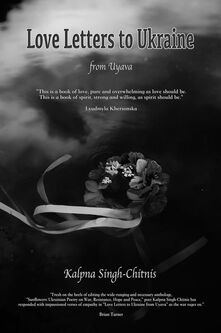
Kalpna Singh-Chitnis, Love Letters to Ukraine from Uyava, River Raw Press, 2023. 95 pp.
Couched in heart-warming and heart-rending imagery, Kalpna Singh-Chitnis transports us in Love Letters to Ukraine to that fraught country on the Black Sea, that brings us echoes of other warfronts, but also to the power of love, that empathetic meeting of souls. She believes one can demonstrate an ethic of care even while being miles away from a people and culture different from one’s own.
The notion of feeling with the other’s pain is the ground of peace, Singh-Chitnis reminds us in her emotional rendering of pain and love. In “Sunflower,” she captures our ability to intervene in someone’s suffering, here, a young Ukrainian boy burdened with the horror of war around him. She urges us to grab the sunflower she draws for him and offer it to him, for his burden is ours. “In his halt are the hopes for the future.” The witness “watering the seeds / of their dreams and compassion,” conjuring “rain clouds” to douse the beloved’s “nation in flames,” brings the reader home to a koan about love that has to pass the test of fire.
The poet is aware of the difficulty of keeping a love for the other alive. In ”Phoenix,” she expresses this reality in the opening image, “We sound like empty drums / in the stillness of night.” Yet there is the hope that if one keeps looking into the eyes of those on “continents divided,” one will “rise like a Phoenix / from the ashes of my being / in your skies, blue and yellow.” The final image, symbolic of Ukraine, is also literally the elemental freshness of a new dawn, and a transformation of the poet and her subject. We enter with the poet the autumn garden to watch the miracle of the blooming lotus “even on a day when our pond is tinted with blood.” Singh-Chitnis brings to us a gift in these beautifully crafted poems of simply bearing witness, raising a white flag of peace between those “drenched in the colors of Holi / and you in blood.”
Couched in heart-warming and heart-rending imagery, Kalpna Singh-Chitnis transports us in Love Letters to Ukraine to that fraught country on the Black Sea, that brings us echoes of other warfronts, but also to the power of love, that empathetic meeting of souls. She believes one can demonstrate an ethic of care even while being miles away from a people and culture different from one’s own.
The notion of feeling with the other’s pain is the ground of peace, Singh-Chitnis reminds us in her emotional rendering of pain and love. In “Sunflower,” she captures our ability to intervene in someone’s suffering, here, a young Ukrainian boy burdened with the horror of war around him. She urges us to grab the sunflower she draws for him and offer it to him, for his burden is ours. “In his halt are the hopes for the future.” The witness “watering the seeds / of their dreams and compassion,” conjuring “rain clouds” to douse the beloved’s “nation in flames,” brings the reader home to a koan about love that has to pass the test of fire.
The poet is aware of the difficulty of keeping a love for the other alive. In ”Phoenix,” she expresses this reality in the opening image, “We sound like empty drums / in the stillness of night.” Yet there is the hope that if one keeps looking into the eyes of those on “continents divided,” one will “rise like a Phoenix / from the ashes of my being / in your skies, blue and yellow.” The final image, symbolic of Ukraine, is also literally the elemental freshness of a new dawn, and a transformation of the poet and her subject. We enter with the poet the autumn garden to watch the miracle of the blooming lotus “even on a day when our pond is tinted with blood.” Singh-Chitnis brings to us a gift in these beautifully crafted poems of simply bearing witness, raising a white flag of peace between those “drenched in the colors of Holi / and you in blood.”
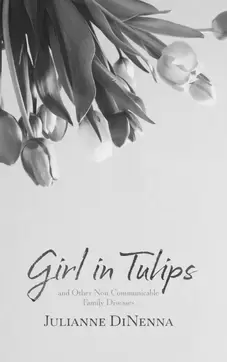
Julianne DiNenna, Girl in Tulips, Fernwood, 2023, 97 pp.
Reading Julianne’s poems, I wondered how a mother who has lost her young daughter to cancer had the strength to speak her sorrow in poetry that is a detailed record of the progress of the disease and is also melodious to the ear. The mother writes her poems witnessing not just her child’s suffering but shows us the love of a mother for her child, a love that helps her to let go. When she begs her daughter to “plead Heaven to … / pull you toward the womb that once housed / your head, your heart, your skin, your spirit / like the ocean pulling at the shore,” she expresses her yearning to keep that memory of birth eternal. The mother’s sorrow at the inevitability of her child being swept away from her makes the reader beg the Almighty with her “to pass over, pass you over, pass you over / so together we unzip, rip, and cross this cancerous Nile.” The disease is indeed the unknown waters that separate the living and the dying.
It is the prayerful attention of the mother to record every moment of her daughter’s body battling the cancer, dealing with the treatment, and the day-to-day developments mentally and physically that make these poems stunning. The polysyllabic names of medicines become mantras, poetic in their rendering as they enter the body of the daughter. The CT scans and x-rays that the poet studies become verse, such as “flashed images of your brain show/ its dimpled synaptic symmetry / contours, ventricles, secret channels, / celestially snug in a shell.” She uses the metaphor of the angels of fury to describe chemotherapy—how the perfect body breaks. She rages against oxymorons, such as pediatric and oncology, because “it hurts when one cancels out the other.” So “all I can do is rub your feet / hold your cold hands / kissing the booboo has not made it better.” When she receives blood infusion, the mother wonders about the strangeness of a stranger’s blood flows into her veins “winding round to where your blood can hold on its own / and where the blood I gave you and all I can do as a mother end.” How dependent are we on more than our blood connection. The mother’s realization of the limits of her power as mother makes her ask, “Will I still be your mother?” DiNenna couches this haunting question in the Biblical story of Abraham, Sarah, and Isaac, seeing herself as both Sarah and Abraham as she utters, “No one ever told me to sacrifice you never said you’d be an offertory lamb on a grill.” The poet describes swathing her “rag doll body over yours . . . / zip my fingers up your spine, / squeeze muscles, breast, belly, heart to your heart,” yearning to get back into the first memory of the mother’s heart beating in sync with her baby’s. DiNenna’s outpouring of emotions end with her beautiful poem, “Talitha Cumi,” a valediction to the departed child to “open to yourself, ruffle your wings, fly, soar.” These poems offer us a gift of love between a mother and daughter that transcends death.
Reading Julianne’s poems, I wondered how a mother who has lost her young daughter to cancer had the strength to speak her sorrow in poetry that is a detailed record of the progress of the disease and is also melodious to the ear. The mother writes her poems witnessing not just her child’s suffering but shows us the love of a mother for her child, a love that helps her to let go. When she begs her daughter to “plead Heaven to … / pull you toward the womb that once housed / your head, your heart, your skin, your spirit / like the ocean pulling at the shore,” she expresses her yearning to keep that memory of birth eternal. The mother’s sorrow at the inevitability of her child being swept away from her makes the reader beg the Almighty with her “to pass over, pass you over, pass you over / so together we unzip, rip, and cross this cancerous Nile.” The disease is indeed the unknown waters that separate the living and the dying.
It is the prayerful attention of the mother to record every moment of her daughter’s body battling the cancer, dealing with the treatment, and the day-to-day developments mentally and physically that make these poems stunning. The polysyllabic names of medicines become mantras, poetic in their rendering as they enter the body of the daughter. The CT scans and x-rays that the poet studies become verse, such as “flashed images of your brain show/ its dimpled synaptic symmetry / contours, ventricles, secret channels, / celestially snug in a shell.” She uses the metaphor of the angels of fury to describe chemotherapy—how the perfect body breaks. She rages against oxymorons, such as pediatric and oncology, because “it hurts when one cancels out the other.” So “all I can do is rub your feet / hold your cold hands / kissing the booboo has not made it better.” When she receives blood infusion, the mother wonders about the strangeness of a stranger’s blood flows into her veins “winding round to where your blood can hold on its own / and where the blood I gave you and all I can do as a mother end.” How dependent are we on more than our blood connection. The mother’s realization of the limits of her power as mother makes her ask, “Will I still be your mother?” DiNenna couches this haunting question in the Biblical story of Abraham, Sarah, and Isaac, seeing herself as both Sarah and Abraham as she utters, “No one ever told me to sacrifice you never said you’d be an offertory lamb on a grill.” The poet describes swathing her “rag doll body over yours . . . / zip my fingers up your spine, / squeeze muscles, breast, belly, heart to your heart,” yearning to get back into the first memory of the mother’s heart beating in sync with her baby’s. DiNenna’s outpouring of emotions end with her beautiful poem, “Talitha Cumi,” a valediction to the departed child to “open to yourself, ruffle your wings, fly, soar.” These poems offer us a gift of love between a mother and daughter that transcends death.
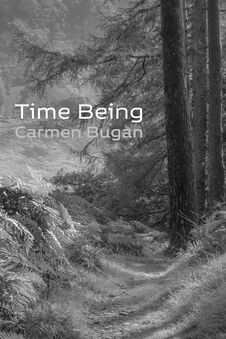
Carmen Bugan, Time Being, Shearsman, 2022. 97 pp.
If you are in the mood for lyricism in language that intoxicates you with its flowing rhythms, bringing with it the sounds of birds, sea life, flowers and animals, water and wind, then you will find a treat in Carmen Bugan’s Time Being. She explores the stasis during the coronavirus pandemic when people were in lockdown and “people [fell] like grapes from vines.” The poems explore how a family handled their new reality by discovering more about each other, exploring the natural world, taking in the small wonders of the garden, the beach, treasures found in the water and the yard, experiencing their love of each other, for bread making, drawing and their conversations with each other. The children become the muses offering freshness of language that make the poems bloom as they do the poet’s heart, although while delighting in her children, she begins to feel the cracks in the marriage, such that sometimes the wings of a hawk, a sign pf good omen, “gliding out of view” becomes “hard to hold.”
The collection begins with a brilliant poem, “The house of shells,” that pictures the speaker drawing a house and filling it with walls, windows, roof and a garden, using materials from the yard. The family moves into their new house in a new country, their belongings travelling the Atlantic. The drawing then takes on the reality of the family building their home, inviting the cardinals and the blue jays into their lives, planting roses and herbs and watching them grow, finding nurture in the “clouds… [that] bloom above the water,” and the “granular melody unfolding… the orchestra of waves and wind.” Following the signs from nature, and the metaphor of the poet unhooking the hook from a fish’s mouth and setting it free, we witness her realization to find freedom for herself and her children.
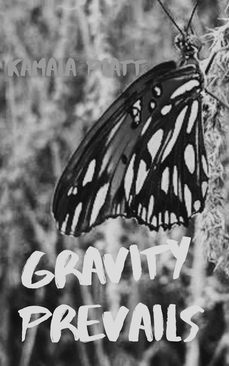
Kamala Platt, Gravity Prevails, Flower Song Press, 2022. 107 pp.
In this moment of climate emergency, Kamala Platt’s book offers us not just the historical reasons for why and how we have reached this precarious point for the planet, but also a blueprint for how we can learn from the lessons of the inhabitants on this planet whose cultures and practices have been marginalized. Platt’s concerns are the swallows that suffocate or “die / from lack of food,” that “hypothermic sea turtle… / warehoused, bathed in plastic kiddy pools … / hoping to reverse genocide.” In the crisis that the planet and old cultures find themselves in, she prays for the replenishment of the elements: “Let the earthworms and microbes / return to this land.” Dirt is alive “with microbes to grow / the fruits, veggies and flowers of our labor.”
Aware that it is going to take a collective effort, Platt brings in the personal, her own investment in her environment. For example, in “Westside Gardens,” she shares her harvest, a chili pequin bush, with a stranger. He happily picks the berries, excited to see the berries from his native Mexico growing in this corner of Texas. The irony of the imposed border is no accident in this poem, as the stranger and the poet are aware of “the monoculture / the city’s code compliance imposes.” She scatters seeds in a wasteland lot as resistance to the city’s neglect of making green spaces for people, but although the activists’ efforts are bulldozed away, her “resistance plantings take “root as / vine at the base of the border wall being built,” a sign of hope and a smile for border-crossers.”
Out of Sri Lanka: Tamil, Sinhala & English poetry from Sri Lanka & its Diasporas, edited by Vidyan Ravinthiran, Seni Seneviratne & Shash Trevett. 422 pp.
If we ever think of imagination as an instrument to bring about unity and heal people suffering from the trauma of violence, then Out of Sri Lanka accomplishes just that. It is an ambitious undertaking by the editors to bring together the voices of Tamil, Sinhala and English poets from Sri Lanka and the diaspora and resurrect the history of the country, some of which suffered erasure as a result of the horrific civil war that claimed millions of lives. Every poem collected in this volume, either translated from Tamil and Sinhala, or composed in English, is unique, bringing to our attention eye witness accounts of the civil war, of violence unleashed on men, women, and children, descriptions of domestic relationships, exile and longing, the landscape or thinai in Tamil poetics that changes to mirror the horror of war, as well as Anglophone poetry that is influenced by Tamil and Sinhala registers.
Under the category of South Asian literature, this volume has a lengthy shelf period because of its richness, depth, variety, and range. As the editors write, “It is the poets and their translators who have become guardians of a Tamil history unrecognized by the Sri Lankan government.” The recent economic crisis under the corrupt President Gotabaya Rajapaksa who was overthrown by the people, but whose cronies are still present and share the violent ideology of the civil war, only brings home to us the necessity of works of the imagination that can keep the spirit of the people and their history alive.
In this moment of climate emergency, Kamala Platt’s book offers us not just the historical reasons for why and how we have reached this precarious point for the planet, but also a blueprint for how we can learn from the lessons of the inhabitants on this planet whose cultures and practices have been marginalized. Platt’s concerns are the swallows that suffocate or “die / from lack of food,” that “hypothermic sea turtle… / warehoused, bathed in plastic kiddy pools … / hoping to reverse genocide.” In the crisis that the planet and old cultures find themselves in, she prays for the replenishment of the elements: “Let the earthworms and microbes / return to this land.” Dirt is alive “with microbes to grow / the fruits, veggies and flowers of our labor.”
Aware that it is going to take a collective effort, Platt brings in the personal, her own investment in her environment. For example, in “Westside Gardens,” she shares her harvest, a chili pequin bush, with a stranger. He happily picks the berries, excited to see the berries from his native Mexico growing in this corner of Texas. The irony of the imposed border is no accident in this poem, as the stranger and the poet are aware of “the monoculture / the city’s code compliance imposes.” She scatters seeds in a wasteland lot as resistance to the city’s neglect of making green spaces for people, but although the activists’ efforts are bulldozed away, her “resistance plantings take “root as / vine at the base of the border wall being built,” a sign of hope and a smile for border-crossers.”
Out of Sri Lanka: Tamil, Sinhala & English poetry from Sri Lanka & its Diasporas, edited by Vidyan Ravinthiran, Seni Seneviratne & Shash Trevett. 422 pp.
If we ever think of imagination as an instrument to bring about unity and heal people suffering from the trauma of violence, then Out of Sri Lanka accomplishes just that. It is an ambitious undertaking by the editors to bring together the voices of Tamil, Sinhala and English poets from Sri Lanka and the diaspora and resurrect the history of the country, some of which suffered erasure as a result of the horrific civil war that claimed millions of lives. Every poem collected in this volume, either translated from Tamil and Sinhala, or composed in English, is unique, bringing to our attention eye witness accounts of the civil war, of violence unleashed on men, women, and children, descriptions of domestic relationships, exile and longing, the landscape or thinai in Tamil poetics that changes to mirror the horror of war, as well as Anglophone poetry that is influenced by Tamil and Sinhala registers.
Under the category of South Asian literature, this volume has a lengthy shelf period because of its richness, depth, variety, and range. As the editors write, “It is the poets and their translators who have become guardians of a Tamil history unrecognized by the Sri Lankan government.” The recent economic crisis under the corrupt President Gotabaya Rajapaksa who was overthrown by the people, but whose cronies are still present and share the violent ideology of the civil war, only brings home to us the necessity of works of the imagination that can keep the spirit of the people and their history alive.
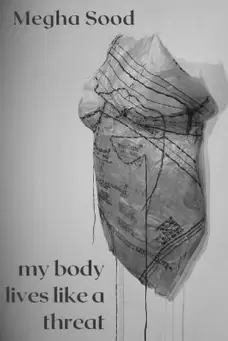
Megha Sood, My Body Lives like a Threat, Flower Song Press, 2022. 73 pp.
As we witness the genocide in Gaza in the last few weeks, Megha Sood’s poems are a scream of protest in a masculinist, militaristic world oppressing the vulnerable. Voices of the living and ghosts of the dead speak their sorrow and their yearning. When people’s houses are burned and they bury their loved ones, they yearn for hope. In “Missed Boat,” the speaker speaks her hopelessness, “All I care about now / I that I should run and hide / like hunted prey.” With the urgency of men, women and children dying as a result of state policies and the cruelty of borders, the poet along with her audience is stunned at the silence, the lack of protest. She ends her haunting refrain, “We never protest,” with “we hold onto our precious words / like bundles of old currency in a foreign country.”
The poet intervenes among the different characters and speaks assertively about her determination to stand up to dominant forces. She declares, “My body is not an apology. / it doesn’t desire to fit in a frame.” Refusing to fit the patriarchal mold is the kind of resistance she says she want to pass on to the next generation. Not rules but love and kindness that her mother doles out with her kneading chappati flour is what the poet wants to teach her son who tends to correct his mother’s pronunciation. She would like him to see the people around him with all their unique pronunciation “beautifully kneaded together.” Perhaps offering love in our immediate circle is the only thing we can do in a world that is tone-deaf to our cries for freedom. As much as we would like a happy conclusion, Sood leaves the threats to minorities unanswered, for there is more violence on the horizon.
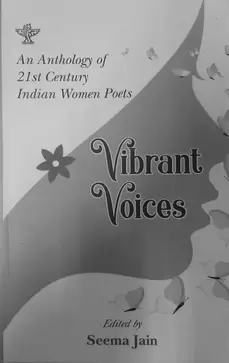
Vibrant Voices: An Anthology of 21st Century Indian Women Poets, edited by Seema Jain, Sahitya Akademi, 2022. 236 pp.
A couple of decades ago, readers wondered how many women wrote poetry in India in English. At that time, there was a debate about the strength of poetry written in English by Indians. Vibrant Voices proves quite the opposite on both counts: We have more women poets writing in English than we can count, and their poems have a variety of aesthetics and contribute to the richness of what is 21st century Indian poetry. Editor Seema Jain has gathered a variety of voices from different regions, linguistic and faith backgrounds, that speak about experiences of injustice, power, nature, friendship, love, motherhood, childhood, and much more.
Personal journeys, family dynamics, societal expectations and a variety of emotions ranging from fear and anger to loneliness and love grace this volume. Many poems describe experiences of patriarchy inscribed into every sphere of women’s lives, while others celebrate the innate power of women and ways to find freedom. Mamang Dai’s “The River” and “The Sorrow of Women,” Saranya Francis’ “On Freedom,” Kavita Ezekiel Mendoca’s “Those Bombay Sundays,” Waheeda Hussain’s “I am a Woman,” Deepti Naval’s “There’s a Bird in my Ceiling,” Usha Akella’s “Harmony,” Uma Trilok’s “Woman,” Sukrita Paul Kumar’s “Allepo, Syria,” Sujatha Mathai’s “Goddess Without Arms,” and Zilka Joseph’s “Sparrows and Dust,” are some of the outstanding poems in this volume.
A couple of decades ago, readers wondered how many women wrote poetry in India in English. At that time, there was a debate about the strength of poetry written in English by Indians. Vibrant Voices proves quite the opposite on both counts: We have more women poets writing in English than we can count, and their poems have a variety of aesthetics and contribute to the richness of what is 21st century Indian poetry. Editor Seema Jain has gathered a variety of voices from different regions, linguistic and faith backgrounds, that speak about experiences of injustice, power, nature, friendship, love, motherhood, childhood, and much more.
Personal journeys, family dynamics, societal expectations and a variety of emotions ranging from fear and anger to loneliness and love grace this volume. Many poems describe experiences of patriarchy inscribed into every sphere of women’s lives, while others celebrate the innate power of women and ways to find freedom. Mamang Dai’s “The River” and “The Sorrow of Women,” Saranya Francis’ “On Freedom,” Kavita Ezekiel Mendoca’s “Those Bombay Sundays,” Waheeda Hussain’s “I am a Woman,” Deepti Naval’s “There’s a Bird in my Ceiling,” Usha Akella’s “Harmony,” Uma Trilok’s “Woman,” Sukrita Paul Kumar’s “Allepo, Syria,” Sujatha Mathai’s “Goddess Without Arms,” and Zilka Joseph’s “Sparrows and Dust,” are some of the outstanding poems in this volume.
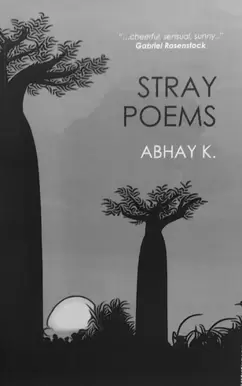
Abhay K., Stray Poems, Poetrywala, 2022. 94 pp.
Looking back into history and recalling the historic travels of Hiuen Tuang and others from China to Nalanda, Abhay K. takes his readers on a grand tour of the earth with its treasures of knowledge and love and nature, as well as the cosmic bodies which impact our planet and affects our relationships and emotions. Far from being stray poems, this volume offers thoughtful reflections about our age-old wisdom wrapped in sacred texts of our various faiths.
The resurrection of Nalanda, ancient seat of Buddhist wisdom, “like phoenix . . . / from the ashes of my burnt books”, is symbolic, for as Abhay K shows us in poem after poem that we urgently need to take care of our artefacts and our planet, not “happily [keep] hoping” that governments will do something “when our home [is] burning,” for earth is “cosmic oasis, cosmic blue pearl.” Nature is untrammeled: “The river bears no blood stains, partition papers, / Silk flags, passports, blue or green / Or other remains of dark midnights.” We realize with the poet that the meeting of humans, of human with nature is a tiny “moment when space-time ceases to exist.” We record impressions that uplift us enough to admire the cosmos, and celebrate the faraway planets with hyperboles, such as the moon as a “cosmic lamppost,” “soft and serene,” but also “cratered,” its darkness causing high tides; Saturn as a celestial gymnast… whirling like a dervish;” and Jupiter as a “break dancer.” Sometimes echoing T.S. Eliot and the Romantics, Abhay K. takes us on a journey that is a feast for the eye and the ear.
Looking back into history and recalling the historic travels of Hiuen Tuang and others from China to Nalanda, Abhay K. takes his readers on a grand tour of the earth with its treasures of knowledge and love and nature, as well as the cosmic bodies which impact our planet and affects our relationships and emotions. Far from being stray poems, this volume offers thoughtful reflections about our age-old wisdom wrapped in sacred texts of our various faiths.
The resurrection of Nalanda, ancient seat of Buddhist wisdom, “like phoenix . . . / from the ashes of my burnt books”, is symbolic, for as Abhay K shows us in poem after poem that we urgently need to take care of our artefacts and our planet, not “happily [keep] hoping” that governments will do something “when our home [is] burning,” for earth is “cosmic oasis, cosmic blue pearl.” Nature is untrammeled: “The river bears no blood stains, partition papers, / Silk flags, passports, blue or green / Or other remains of dark midnights.” We realize with the poet that the meeting of humans, of human with nature is a tiny “moment when space-time ceases to exist.” We record impressions that uplift us enough to admire the cosmos, and celebrate the faraway planets with hyperboles, such as the moon as a “cosmic lamppost,” “soft and serene,” but also “cratered,” its darkness causing high tides; Saturn as a celestial gymnast… whirling like a dervish;” and Jupiter as a “break dancer.” Sometimes echoing T.S. Eliot and the Romantics, Abhay K. takes us on a journey that is a feast for the eye and the ear.

Usha Akella, I Will Not Bear You Sons, Spinifex, 2021. 127 pp.
A radical feminist voice among the poets I read in the last two years has been Usha Akella’s I Will Not Bear You Sons. The speaker of the titular poem strikes out at patriarchy by declaring that she will bear only daughters, that her will not be “a misspelling by [male] desire.” She believes women have the power to fight against male preference exemplified in the selective abortion of female fetuses. In poem after poem, Akella examines the nature of patriarchy, the dimensions it takes in the family and even coopting women in its grand march colonizing society at every level.
Just as the poet implores us to bring “our caged children to a field of sunflowers,”—migrants or civilians caught in a war—she wants women to find their power. The question burning in many of the poems, such as “Naming,” is how women can deal with the trauma of violence on their bodies: “Her mother’s eyes were dark charcoal, unspilled lakes.” Even in the depth of pain from an uncaring patriarchy, the speaker of “They Cannot Persist in the Sunlit Room” realizes that as much as her life as an artist and as a woman resembles Sylvia Plath’s, she is not Sylvia, for the river she thinks of jumping into “streamed upward / …/ and I heard a black goddess command / Live!” Imagination is the power the artist has, as Usha Akella shows in her brilliant craft, inspiring her readers.
A radical feminist voice among the poets I read in the last two years has been Usha Akella’s I Will Not Bear You Sons. The speaker of the titular poem strikes out at patriarchy by declaring that she will bear only daughters, that her will not be “a misspelling by [male] desire.” She believes women have the power to fight against male preference exemplified in the selective abortion of female fetuses. In poem after poem, Akella examines the nature of patriarchy, the dimensions it takes in the family and even coopting women in its grand march colonizing society at every level.
Just as the poet implores us to bring “our caged children to a field of sunflowers,”—migrants or civilians caught in a war—she wants women to find their power. The question burning in many of the poems, such as “Naming,” is how women can deal with the trauma of violence on their bodies: “Her mother’s eyes were dark charcoal, unspilled lakes.” Even in the depth of pain from an uncaring patriarchy, the speaker of “They Cannot Persist in the Sunlit Room” realizes that as much as her life as an artist and as a woman resembles Sylvia Plath’s, she is not Sylvia, for the river she thinks of jumping into “streamed upward / …/ and I heard a black goddess command / Live!” Imagination is the power the artist has, as Usha Akella shows in her brilliant craft, inspiring her readers.
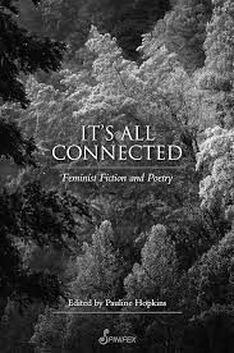
It’s All Connected: Feminist Fiction and Poetry, edited by Pauline Hopkins, Spinifex, 2022. 234 pp.
Women’s contributions in fiction and poetry is the focus of this anthology from Spinifex that publishes feminist writing. While most of the contributors are from Australia, writers from other countries are also included. So the range of writing makes this anthology spirited, offering some unique poems and stories for a variety of readers. As the editor notes, “Some pieces are poignant; others are funny or tragic. Some seethe with anger, others swell with joy. Some are manifestly Australian in flavor, others distinctly international; some are universal, drawing on myths and stories many of us know. All are relatable, challenging and thoughtful.”
There is the consciousness of indigenous people on the land in some of the poems, as in Sandy Jeffs’ “Christmas Hills Rhapsody,” that pay homage to “the ancient stories that join / tribes to ancestors long gone.” The writers believe, in the words of Gina Mercer, that their words create “a new world” … “fomenting gentle revolutions.”
Women’s contributions in fiction and poetry is the focus of this anthology from Spinifex that publishes feminist writing. While most of the contributors are from Australia, writers from other countries are also included. So the range of writing makes this anthology spirited, offering some unique poems and stories for a variety of readers. As the editor notes, “Some pieces are poignant; others are funny or tragic. Some seethe with anger, others swell with joy. Some are manifestly Australian in flavor, others distinctly international; some are universal, drawing on myths and stories many of us know. All are relatable, challenging and thoughtful.”
There is the consciousness of indigenous people on the land in some of the poems, as in Sandy Jeffs’ “Christmas Hills Rhapsody,” that pay homage to “the ancient stories that join / tribes to ancestors long gone.” The writers believe, in the words of Gina Mercer, that their words create “a new world” … “fomenting gentle revolutions.”




